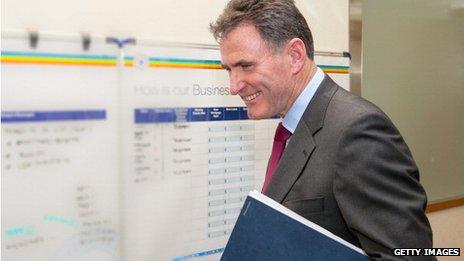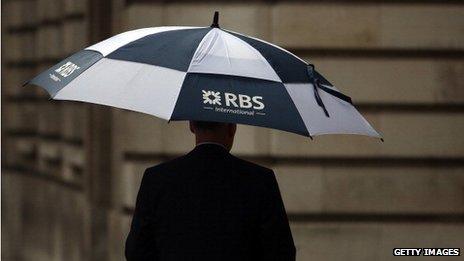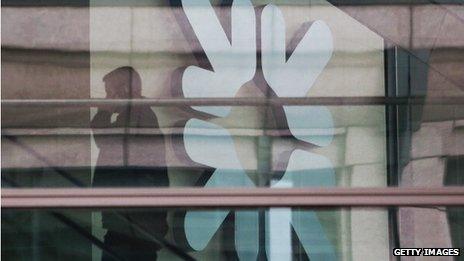RBS: Ross McEwan speech in full
- Published

The chief executive of RBS, Ross McEwan, has outlined his company's strategy to the public after it reported a loss of £8.2bn for 2013. RBS is 81% owned by the taxpayer. The following is his speech in full:
Thank you for joining me here today and many thanks to The Trampery for hosting us.
I visited the Trampery's sister office in Farringdon in my second week in the job in October. I left excited by the energy and potential of the entrepreneurs I had met. And I am pleased to be able to come here today to speak about my new plan for RBS.
Strategic Thought
Organisational strategies are often very complex. For me it is very simple. As an organisation we must remember and then never forget that RBS exists to help our customers, to support them, and to make their lives easier.
We cannot do this if our customers do not trust us. We are the least trusted company in the least trusted sector of the economy. That must change. So the goal of my plan is very simple. We have to be a bank that earns your trust.
And let me be clear. RBS is not going to regain trust through charitable donations and expensive advertising campaigns.
We are going to get on with the job of being a much better bank.
I know I am not the only banker using this sort of language. But I assure you I am serious about making this language meaningful and delivering real change.
I will set out in a moment how I plan to do that - for example, calling time on teaser rates, on special deals that penalise existing customers, and on preferential online rates that disadvantage branch customers.
Listening to our customers
But to shape the future we have to understand the past.
I do not plan to repeat in detail what is well known to everyone but I will simply say this: RBS lost its way before 2008 because it became detached from the customer-focused values that have to be at the heart of any bank.
The Bank, and of course the British taxpayer, paid a very heavy price for the self-serving decisions that were made at RBS.
I have made it my job over the last five months to listen: to listen to staff, to customers, to regulators, to Government, and to our private sector shareholders.
The people you saw in the video played before I spoke were among the hundreds I have met as I have travelled around the country. Everyone I met had different stories and different personal circumstances. But the themes I heard were consistent. They were challenging. But they were also encouraging.

What I have learned is that our customers and our staff have not given up on us. They know that everyone in the UK has a stake in RBS. They see often that we have good employees with good intentions. Our customers are often frustrated, but if we can get our house in order, they are eager for us to support them to meet their financial goals.
They do want us to succeed. I really believe that. But they want us to do much better. I know we can.
The first thing is to have real clarity about our ambition. As a bank, we spent the decade leading up to 2008 trying to get bigger and bigger. We tried very hard to become famous. And boy did we succeed.
So we need to do something about the fact that it can take up to five months to open a business banking account and that in 2014 you still cannot open a personal current account in one day.
We need to keep supporting our top quality relationship managers who are helping thousands of businesses all around the country.
We need to acknowledge that the sale of interest rate swaps and PPI has seriously undermined trust in this industry.
But we should celebrate that our customers like our branch staff and do trust them to do the right thing for them.
We need to understand that allegations of mis-treatment of small business customers have undermined trust in this bank. We have to restore that trust. But we need to make sure that we do not lose the skills and abilities from a team that has saved over 162,000 British jobs by successfully restructuring 700 companies during 2013.
And we need to recognise that while we have the best online and mobile banking in the UK market, customers will not give you credit for innovation that is not built on a resilient and reliable platform.
The customers I have met have told me that they have not given up on us. This is a bank that was worth saving and it remains a bank that is worth improving. We can make this a bank that earns the trust of our customers and re-earns that trust every day.
Creating Stronger Foundations
So how will we earn people's trust?
So let me spell it out very clearly: the days when RBS sought to be the biggest bank in the world - those days are well and truly over.
Our ambition is to be a bank for UK customers, the best bank for UK customers. A bank that gets the basics of everyday banking right. A bank that can support small businesses to grow. A bank that provides support for the biggest UK companies and employers as they play their full role in the global economy. A bank that earns the trust of our customers every day.
Change will not happen overnight. It will require hard graft. It will also require us to do things differently so people can judge success for themselves.
We cannot take trust for granted. We have to earn it by how we act and how we behave. Today won't be the end of bad headlines. Past failures will continue to haunt us. But we can weather them.
A Stronger Platform
The challenge now is to develop stronger foundations - financial and cultural.
We cannot spend money as though we are in profit when we have lost £46 billion in six years.
So we need to be a smaller, simpler and smarter bank. We have to protect the foundation of the bank: our capital position. No one can ever doubt again that RBS will be a strong and secure bank. I will do whatever it takes to put the strength of our capital position beyond doubt. Capital strength is a cornerstone of trust.
We also have to be smaller. An RBS that is no longer trying to take on the world will not require a back office as big as the one we have today. That will mean making difficult choices on jobs in the years ahead.
We have to be simpler. We need to cut our cost base. Our cost to income ratio has soared to over 70%, in a normal state we need to get that down to around 50%. This year that will mean cutting around £1 billion of operational spending on things that don't help our customers.
We will move from a corporate structure fit for a global titan to one better suited to a first-rate UK bank.
We will move from a bank with seven divisions, with seven HR departments, seven product departments and seven operations teams to a bank with three customer businesses - personal, commercial, and corporate - supported by one shared support structure. We will make this a much simpler bank.
These changes will also allow us to invest, particularly in our technology. We have made progress over the last year in improving the resilience of our systems, but our customers are still experiencing outages.
Our investments in the next twelve months will continue to focus on resilience. And once we have a resilient base, in the following two years we will seek to make progress in building an agile and flexible technology platform that makes banking easier for our customers.
Let me address briefly the issue of bonuses. I made it clear when I took this role that I did not want to be considered for a bonus for 2013 or 2014. I did this because I wanted the distraction of the annual bonus to be taken off the table and to be able to focus on the job.
We have made progress already in the way the people in our branches are measured on the customer service they deliver, rather than the products they sell, but I know we need to go further.
The annual bonus round is undermining trust with our customers and further change is needed. A shrinking but still important part of our business operates in international markets and our customers expect us to have the best people in the world supporting them in those markets. We will keep increasing the link between pay and performance and will continue to be a back marker for pay in investment banking.

But in our UK high street bank, and the operations that support it, I want to see everyone measured and rewarded for what they do for customers. We must improve current arrangements to improve trust. I will give more details on this later in the year.
Customer
If we improve our financial and cultural platform we will be a very different bank. But our customers will legitimately ask - 'This is all well and good but what does it mean for me? How is it going to help me in my life now?' - and they would be right to ask. So let me tell you that the work to earn back the trust of our customers starts now.
Firstly, we will stop offering deals and products to new customers that we are not prepared to offer our existing customers. Sweeteners and cash payments might encourage people to switch banks but they send a terrible message to loyal customers and to staff about our priorities. This practice has no place at the new RBS I am building.
While long-established business customers will always understand, for example, that you provide free banking to help a start-up, they won't tolerate discriminatory rates for established business owners who switch from another bank.
If we have an offer it will be for all customers, new and old. Introductory offers are not fair.
We will also ban teaser rates, including zero percent balance transfers in our credit card business. Others can continue with this but we will not be in the business of trapping people in debts they cannot afford. We will run a credit card business that is fair and transparent for our customers. This new policy will be in force from mid-March.
The second big thing we're going to do is to stop offering different rates to customers who apply online, in branch or by phoning our call centres. Customers should be able to bank with us in the way that is best for them. Our branch staff should not have to send customers away to apply for products online when they could just help them there and then. A lot of people are talking down the value of branches these days and banking is changing.
Our busiest branch in 2014 is the 7:01 from Reading to Paddington - over 167,000 of our customers use our Mobile Banking app between 7am and 8am on their commute to work every day. Over 2.1 million customers use our mobile app every week.
We have to be where our customers are, which is why we announced last week that customers could deposit and withdraw money through the Post Office. Moves like this are so important because with 30% declines in branch usage since 2010, we will have less of them over time.
But I am a firm believer in the value and the future of the High Street branch. And RBS will retain a very large branch network. Our branches need to be places where great conversations take place, places where our staff help people plan for their futures and get on top of their finances.
The third thing we will do is to put business bankers back on the high street. We will have hundreds of Business Bankers in our branches to help small business people open accounts, apply for loans, and get the help they need. We will start making small business lending decisions in five days, not five weeks.
If you have an idea for a business and need a loan to expand, you don't have time for weeks and weeks of discussions with your bank. You will get a clear 'yes' or 'no' from us, and you will get it quickly.
Fourthly, we will stop confusing our customers with complicated language they cannot understand. By the end of this year we will be able to explain all of our personal and SME charges on one side of A4. We will use simple language in our customer letters, on our websites and in our branches.
By the end of this year we will cut in half the number of personal and SME products on offer. We need a smaller number of simpler, good value loans and accounts. The vast array of products banks currently offer serve only the industry, not our customers.
And the fifth thing we will do is speed up our account opening process for personal customers. We will cut how long it takes to open a personal current account from five days to next day by the end of this year.
Last year we reduced the time it takes to get a debit card to three days. And now, by the end of this year, you will have access to Mobile Banking and Online Banking within one day. We will also improve the process to open a personal current account online so customers can upload their identification, such as their passport, and open their entire account from home.
As I speak, our staff are preparing to make these changes. In the coming days we will be taking down the marketing material and cancelling the advertising for products I can no longer support. These changes are happening now and I will update you on our progress throughout the year.
Taxpayer
We are doing all these things because they are transparently the right thing to do. They are fair to our customers and fair to the British taxpayer who own the majority of the bank.
I also want to take this opportunity to be straight with the British people. We need to recognise that we are not yet a strong enough bank that can be privatised at a profit for the taxpayer in the immediate future. The journey to recovery and renewal is harder than was first anticipated back in 2008. There is no point avoiding this inconvenient truth.
We know that paying back the taxpayer is important but we also know that the taxpayers of this country want the bank they saved to help change the industry and the economy for the better. That is what we will do. What I will deliver is a bank that taxpayers can be proud of. I will deliver a bank that earns customer trust. I will deliver a bank that is number one for customer service in every customer category we compete in, from personal banking to support for big UK businesses.
And together, with my team, and everyone who works at RBS, we will build a bank that is an asset to the UK.
Conclusion
Change will be hard. But we will build a bank that earns your trust.
Thank you.